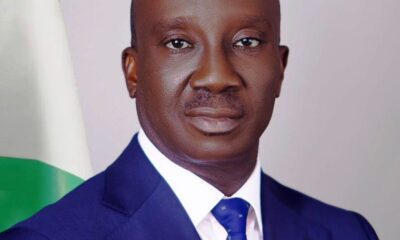Opinion
That Presidential Directive On Kidnapping
Kidnapping is a recurring problem of Nigeria. Almost daily cases of kidnapping are reported in the country without any sign of abating. Meanwhile, worried by the frequent cases of kidnapping in the South Eastern part of the country, President Goodluck Jonathan has directed that a joint military operations be carried out to flush out kidnappers in the South East. The President gave this directive at the weekly meeting of the Federal Executive Council which held on June 10, 2010. He described the situation as worrying and further directed all security agencies in the country to make the Eastern Region uncomfortable for kidnappers. President Jonathan expressed displeasure at the rate of kidnapping in the South East and emphasized that something urgent must be done to arrest the situation. However, the concern of the President can be appreciated. No Head of State can tolerate a situation where criminals daily kidnap law abiding citizens and either kill them or hold them for ransom that runs into millions of naira. As the President has directed, the security outfits in our country should fight and stamp out this criminal activity in our country. It should therefore be arrested.
In her own remarks, the Minister of Information and Communication, Professor Dora Akunyili says it: is unacceptable for any human being to pick a fellow human being in the name of kidnapping and demand for ransom. According to her the governors of the South East are already working to ensure that the menaces is curbed in the Region. Similarly, Governor Chibuike Rotimi Amaechi of Rivers State has promised to fight kidnapping at the border between Abia and Rivers States. He made the promise recently at a thanksgiving service in Oyigbo, Rivers State. The Governor decried the prevalence of criminal activities at the border between the two states. He urged parents to advise their children to desist from criminal activities. In fact, we are in agreement with the Governor. Parents should bring up their children in the right way so that when they grow up they will not constitute problems to society. It should be noted that delinquent children are mainly the problems of society. Any well brought up child cannot deviate from societal standards when he grows up.
Elsewhere in the country cases of kidnapping have been reported. For instance, between April and October, 2009, two major cases of kidnapping took place in Kaduna State. The secretary to the Kaduna State Government, Mr Waje Yayor was kidnapped on September 22, 2009, by unidentified persons. They demanded forty million naira ransom from the state government for his release. Mr Yayor was reported to have left his house at about 8p.m to distribute invitation cards for his daughter’s wedding when he was kidnapped. He was taken to Delta State and later released after ten days in captivity. Also a forty year old Canadian women Mrs Julie Ann Mulligan was abducted in Kaduna. The woman was attending an international conference in Kaduna when she was kidnapped by four gunmen on April 16, 2009. Briefing newsmen on the incident, the Kaduna State Police Commissioner, Mr Tambari Tabo Mohammed said the kidnappers were demanding twenty million naira ransom for her release. He stated that Mrs Mulligan who came to Kaduna from Kano on April 15, 2009, with four others was expected to proceed to Jos, Plateau State, under the auspices of the Rotary International Club.
In any case, because of these cases of kidnapping the Kaduna State government passed anti-kidnapping bill into law. The bill was initiated by the then Governor of the State, Mr Namadi Sambo and sent to the Kaduna State Assembly to pass into law. The House passed the bill into law without delay. According to the law, anyone found guilty of kidnapping in Kaduna State will be sent to life jail without an option of fine. Signing the bill into law the Governor stressed that the law was necessary for good governance of the state. He thanked the House of Assembly for the quick passage of the bill adding that it was sent to the House to curb the menace of kidnapping. The action of the Kaduna State government should be commended. Other state governments should emulate this and make similar laws.
Meantime, the Minister of State for Information and Communications Mr Labaran Maku has appealed to affected communities in the country to co-operate with security operatives to tackle the problem of kidnapping. He said, the Federal Government had called on communities in the South East and other parts of the country where security had become an issue to cooperate with security agencies to fish out criminals wherever they might be hiding and deal with the situation decisively. We should heed the appeal of the federal government and give necessary assistance to security agents to address the problem of kidnapping in the country. Useful hints should be given to the authorities on the hideouts of criminals and kidnappers. It is when we create a crime free society that we can move forward.
Dr Tolofari is a Fellow of Institute of Corporate Administration of Nigeria.
Mann Tolofari
Opinion
Empowering Youth Through Agriculture

Opinion
Of Protests And Need For Dialogue

Opinion
Tackling Noise Pollution in Nigeria

-

 Niger Delta5 days ago
Niger Delta5 days agoPDP Declares Edo Airline’s Plan As Misplaced Priority
-

 Sports5 days ago
Sports5 days agoSimba open Nwabali talks
-

 Nation5 days ago
Nation5 days agoHoS Hails Fubara Over Provision of Accommodation for Permanent Secretaries
-
Niger Delta5 days ago
Students Protest Non-indigene Appointment As Rector in C’River
-
Nation5 days ago
Maternal Mortality: RSG Identifies 6 High Risk Local Government Areas
-

 Niger Delta5 days ago
Niger Delta5 days agoOkpebholo Assures Corps Members Of Improved Welfare
-

 News2 hours ago
News2 hours agoTroops Kill Boko Haram Second-In-Command, 10 Fighters In Borno
-

 News2 hours ago
News2 hours agoUrban Nigerians enjoy 40% faster internet than rural users — NCC

